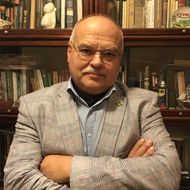- A
- A
- A
- ABC
- ABC
- ABC
- А
- А
- А
- А
- А
- HSE Campus in St. Petersburg
- Institute of Asian and African Studies
- News
- The Department of Japanese Studies Develops Contacts with Universities in Japan
-
Institute
- About the Institute
- Faculty and Staff
-
Departments
-
- Department of Middle Eastern and African Studies
- Department for Chinese, South and Southeast Asian Studies
- Department of Japanese Studies
- Department of Korean Studies
- Department of International Relations and Political Processes in Asia and Africa
- Department of Public and Cultural Development in Asia and Africa
-
- Degree Programmes
190121, Saint Petersburg,
Soyuza Pechatnikov str., 16
The Institute of Asian and African Studies was established in 2022 at HSE University-St Petersburg based on the Department of Asian and African Studies, the undergraduate and graduate programmes in the related field, as well as the Centre for Asian and African Studies. The Institute focuses on the development of professional education along with Asian and African studies as a field of scientific knowledge, aiming to preserve and enhance the achievements of the St Petersburg school of Oriental Studies.
Asian and African Studies
Cross-Cultural Studies of Asia and Africa in the Context of International Relations
 EU–Central Asian Interactions: Perceptions, Interests and Practices
EU–Central Asian Interactions: Perceptions, Interests and Practices
Arynov Z., Bossuyt F., Davletova N. et al.
Abingdon: Routledge, 2024.
Восток. Афро-азиатские общества: история и современность. 2025. Vol. 5. P. 191-200.
In bk.: Handbook on Migration to China. Edward Elgar Publishing, 2025. P. 294-308.
Krivokhizh S., Akopov S.
Basic research program. WP BRP. National Research University Higher School of Economics, 2019. No. 65/PS/2019 .

The Department of Japanese Studies Develops Contacts with Universities in Japan
Currently, HSE Campus in St. Petersburg has agreements with such Japanese universities as Akita University, Kwansei University, Nagoya University of Foreign Studies, Tohoku University and Tokyo International University. Moreover, the students’ exchange is also carried out within the framework of various cultural programs, for example, in November and December 2024, students from the Department of Japanese Studies visited Japan as part of the Japan-Russia youth exchange center. The program participants were very impressed by the visit, during which they not only had the opportunity to visit the capital of Japan, Tokyo, but also communicate with Japanese students and participate in various classes and master classes on the Japanese language and traditional culture. “Unexpectedly, what struck us most was the master class on furoshiki - this is a traditional Japanese piece of fabric that is used instead of a bag and in which objects are wrapped in a special way. It turned out that such a seemingly simple household item is closely related to various Japanese traditions, for example, the culture of gift-giving. It was great to get such an experience directly in the Japanese environment,” note 4th year students Maxim Solovyov and Daniil Sukhorebsky, who took part in the program.
In addition, recently interaction with Japanese universities has been actively developing through the use of information technology.
On November 17, 2024, a joint online seminar was held, in which 3rd year students of the Department of Japanese Studies and Japanese students of Sophia University (Tokyo) studying Russian took part. During the seminar, students were able to get acquainted with and discuss current topics in Russian and Japanese, while practicing speaking skills, as well as consecutive translation from Russian into Japanese and vice versa. “Events like this give even more strength and increase motivation for further study of the Japanese language,” 3rd year students Ekaterina Rezvova and Elena Vedmenskaya shared their opinion after the seminar.
On November 19, 2024, an online seminar was held, which was attended by 1st year students of the Department of Japanese Studies, 2nd year students of the Department for Chinese, South and Southeast Asian Studies and the Department of Korean Studies studying Japanese as a second Eastern language, as well as Japanese students of Nagoya University ( Nagoya). At the seminar, students talked about the peculiarities of life in Russia and Japan, and discussed studying at Russian and Japanese universities.
Participants in online seminars from both the Russian and Japanese sides expressed extremely positive feedback regarding the events, and also demonstrated great interest in continuing communication, including online format. It is expected that with the further development of contacts with universities in Japan, the number of such events and the number of participants involved in them will sufficiently increase.
Olga Klimova
Associate Professor
